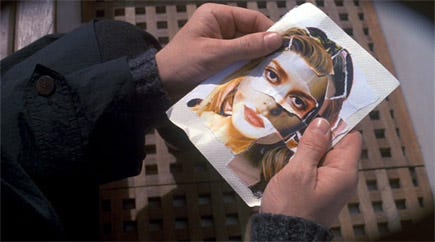It’s the 25th anniversary of The Truman Show (1998) and Armond White is talking shit about it. (He’s the contrarian cranky movie review guy for National Review—his takes are entertainingly bad). He says the movie didn’t predict the future correctly, that its brand of futurism is irrelevant and outdated; and that what our reality became is way worse than the reality TV run amok in The Truman Show. But that is such a small-minded way to look at it. The Truman Show predicted the precise type of schizophrenia that the 21st century Internet/social media age would bring about. And even Covid world, where daily life felt so off, like everyone was going along with an absurd script, was anticipated in the film.
Jim Carrey plays a very normal 30-year-old guy named Truman Burbank who lives in a hyper-controlled, artificial reality on a tiny island community of Seahaven, where every second of his life (including when he sleeps) is recorded for a 24/7 reality TV show. As the film goes along, Truman begins to suspect that things are slightly off. His suspicions that reality isn’t real keep building to a kind of nervous breakdown, and he tells his only friend Marlon (Noah Emmerich) that “It’s like the whole world revolves around me somehow.” Feeling like everyone is watching you and you’re the center of everything is the schizophrenic feeling of social media. This false centrality also marginalizes you, makes you alienated, like you barely exist. This is the special schizophrenia of social media—it’s all about you, but you don’t exist.
That’s precisely Truman’s existence—the whole world around him exists to cater to him, to create his reality. But he himself does not really exist. He is the center of everything, but there is no real person there. That’s what social media and the dominance of digital space does—the more everything caters to you, with algorithms calculated to your precise interests, the less you feel like you even exist, because you don’t have any time or space to discover things you like, have experiences that are unplanned, and become who you really are.
His only real experience is one day in college when Truman catches the eyes of Sylvia (Natascha McElhone) and falls in love with her right away. She was just a background character, but Truman felt a strong connection with her, which the producers of the show did not plan out. They had plans for his future wife Meryl (Laura Linney) to bump into him that day. Truman tracks Sylvia down later that day and the two of them escape to the beach. Sylvia is worried that “they” will come any minute (Truman doesn’t know who “they” refers to, because he doesn’t know he’s in a TV show). They share a passionate kiss and then an actor claiming to be Sylvia’s Dad shows up and takes her away, telling Truman that she is schizophrenic. He never sees her again.
This relationship was the only real moment of Truman's life in Seahaven. Even ten years later, he is still captivated by her, and by the feeling she gave him. He has a habit of combing through fashion magazines looking for models who have facial features similar to Sylvia’s. He makes a collage of these scraps to try to reproduce Sylvia’s face as he remembers it. It’s hard to imagine a better depiction of schizophrenia than this.
It’s also a good prediction of the chaos that digital space would cause on erotic life. The movie came out in 1998, before the Internet porn world really took off and warped people’s sense of eroticism in such drastic ways. Porn always has to have a relation to reality—the porn viewer needs to connect what they’re watching to some real experience, even if only a fleeting one from years ago, for it to produce the desired effect. Truman had that one real experience with Sylvia, and he is trying to find traces in media to reproduce it—a bit from this magazine ad, a bit from another one, pieced together, hoping it will all add up to something real. This is what porn users do—cobble together different clips in the hopes it will all add up to some kind of approximation of a real experience.
Truman has such a tiny amount of reality in his hyper-artificial life, just that one encounter with Sylvia, and he spends his life trying to recapture it, or recreate it, using shards from the media he consumes. Cobbling together reality with shards and pieces, hoping it will add up to something, but it never does—that’s just about the best summary of the 21st century digital hell that we all live with that I’ve ever seen.





Sorry for derailing the topic a little bit, but do you remember EDtv, the sleazier, slightly closer to reality meathead version (literally, Rob Reiner's in it, and he has a pump-up penis implant) about a 24/7 reality TV show?
I remember watching both of these around the same period.
https://youtu.be/6fqiHEoBX80